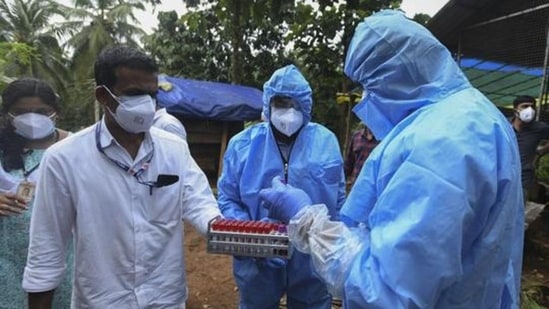Infection
Nipah virus in Kerala is Bangladesh variant, less infectious, high mortality rate
The Kerala government strengthened measures to prevent and contain the spread of the Nipah virus.
The Kerala government said in the assembly on Wednesday that the brain-damaging Nipah virus, which has killed two people out of four infected, was a strain of the Bangladesh variant that spreads from human to human. Kerala Health Minister Veena George said that the variant has a high mortality rate but was less infectious.
George confirmed that the recent “unnatural deaths” in state’s Kozhikode district were a result of the virus. As reported by Reuters, one of the people affected with the virus died this month, while the other death occurred on August 30.
This is the fourth Nipah outbreak in Kerala since 2018. Out of 23 infected people, 21 died when Kerala first reported the Nipah outbreak in 2018. In 2019 and 2021, Nipah claimed two more lives. There are no treatments or vaccines against the virus. The virus is transmitted to humans through direct contact with the bodily fluids of infected bats, pigs or other people. It was first identified in 1999 during an outbreak of illness affecting pig farmers and others in close contact with pigs in Malaysia and Singapore.
Here are the latest updates on the virus situation in Kerala:
- Teams from Pune’s National Institute of Virology (NIV) will arrive in Kerala on Wednesday to set up mobile lab at Kozhikode Medical College meant to test for the Nipah virus and carry out a survey of bats.
- A group of epidemiologists from Chennai will also reach Kerala to carry out a survey.
- On Wednesday, Health Minister George announced a series of measures being implemented to address a health crisis — including surveillance, contact tracing, categorizing individuals into low and high-risk groups, establishing isolation facilities, marking containment zones, and procuring medicines from the Indian Council of Medical Research (ICMR) for those who are infected.
- The Kozhikode administration has declared seven village panchayats — Atanchery, Maruthonkara, Tiruvallur, Kuttiyadi, Kayakkodi, Villyapalli, and Kavilumpara — as containtment zones.
- An alert has also been issued for Kannur, Wayanad and Malappuram districts of Kerala.
- The Indian Council of Medical Research (ICMR) has also agrees to send monoclonal antibodies, required to treat the virus patients.
- People in containtment areas have been asked to wear masks, use sanitizers as well as practice social distancing.
- Kozhikode District Collector A Geetha, in a Facebook post, said on Tuesday that until further notice, no one was allowed to travel in or out of these areas as they have been cordoned by the police.
- Stores selling essential and medical comodities are allowed to function inside the containtment zones from 7 am to 5 pm. However, pharmacies and health centres can function without the time bar.
- Local self-government institutions and village offices will be functioning with minimum staff. However, banks, other government institutions, educational institutions and anganwadis will not be functioning inside the containtment zones. Geetha advised people to use online services and avoid leaving their houses.
- Vehicles travelling on the national highways and going through the containtment zones have also been asked to not stop in these areas.
- The Central government sent a team of health experts to Kerala. Union Health Minister Mansukh Mandaviya said, “I have spoken to the Health Minister of Kerala, there have been reports of this virus several times this season. Cases are coming up, this virus is spread by bats. A guideline has been prepared by the Health Ministry regarding this so that we can take precautions.”
- Chief Minister Pinarayi Vijayan has also urged people to take precautions. He said, “Everyone should strictly follow the instructions of the health department and the police and fully cooperate with the restrictions.”A


